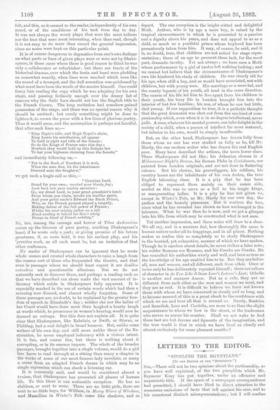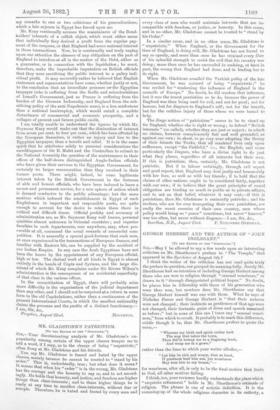LETTERS TO THE EDITOR.,
"SPOILING THE EGYPTIANS."
[To T1M EDITOR OF TUE "SPECTATOR.1
Sin,—There will not be two opinions about the partisanship, as you have well explained, of the two pamphlets which Mr. Seymour Keay has put together, under an offensive andl unpatriotic title. If the space of a newspaper correspondence had permitted, I should have liked to direct attention to the numerous omissions of facts that tell against his case, and to his occasional distinct misrepresentations ; but I will confine my remarks to one or two criticisms of his generalisations, which a late sojourn in Egypt has forced upon me.
Mr. Keay continually accuses the maintainers of the Bond- holders' interests of a selfish object, which must either mean that individually they derived a profit from the regular pay- ment of the coupons, or that England had some national interest in those transactions. Now, he is continually and truly urging upon our attention the absence of any obligation on the part of England to interfere at all in the matter of the Debt, either as a guarantor, or in connection with the liquidation ; he must, therefore, make the improbable imputation on British officials that they were sacrificing the public interest to a paltry indi- vidual profit. It may assuredly rather be believed that English statesmen and representatives have come, whether justly or not, to the conclusion that an immediate pressure orr the Egyptian taxpayer (who is suffering from the faults and miscalculations of Ismairs Government, just as France is suffering from the burden of the German Indemnity, and England from the sub- sidising policy of the anti-Napoleonic wars), is a less misfortune than a national bankruptcy, which would entail a complete disturbance of commercial and economic prosperity, and a collapse of present and future public credit.
I am totally unable to understand the figures by which Mr. Seymour Keay would make out that the diminution of interest from seven per cent, to four per cent., which has been effected by the European financiers, is rather an injury and lose to the Egyptian taxpayer, than a benefit and relief. It is in the same spirit that he attributes solely to personal considerations the unwillingness of Sir E. lt/falet and the Controllers to submit to the National Assembly the question of the maintenance in their offices of the half-dozen distinguished Anglo-Indian officials who have given their services to the Egyptian Government, for certainly no larger remuneration than they received in their former posts. There might, indeed, be some legitimate interest taken by the British Government in the fortunes of able and honest officials, who have been induced, to leave a secure and permanent service, for a new sphere of action which is deemed conducive to the public advantage ; but the same motives which induced the establishment in Egypt of such Englishmen in important and responsible posts, are quite enough to account for the desire to retain them there in critical and difficult times. Official probity and accuracy of administration are, as Mr. Seymour Keay well knows, personal qualities almost unknown in Oriental countries ; and superior faculties in such departments, raze anywhere, may, when pro- curable at all, command the usual rewards of successful com- petition. It is assuredly a special good-fortune that such men, at once experienced in the transactions of European finance, and familiar with Eastern life, can be supplied by the accident of our Indian Empire. In any case the Arab Egyptians have not been the losers by the appointment of any European official, high or low. The clerical work of all kinds in Egypt is almost entirely in the hands of Copts and Syrians, and the large dis- missal of which Mr. Keay complains under Sir Rivers Wilson's administration is the consequence of an accidental superfluity of that class in the various offices.
In the reconstitution of Egypt, there will probably arise more difficulty in the organisation of the judicial department than any other, and I should not be surprised at a return in some form to the old Capitulations, rather than a continuance of the present International Courts, in which the smallest nationality claims the presence and the profits of a distinct functionary.- 1 am, Sir, die.,































 Previous page
Previous page